| Srl | Item |
| 1 |
ID:
124066


|
|
|
|
|
| Publication |
2013.
|
| Summary/Abstract |
This article addresses an underreported aspect of contemporary warring in the Democratic Republic of Congo (DRC): the experiences of women soldiers and officers in the Congolese national armed forces (Forces Armées de la République Démocratique du Congo [FARDC]). It thus addresses an empirical gap in scholarly and policy knowledge about female soldiers in national armies on the African continent, and the DRC in particular. Based on original interviews, the article explores the way female soldiers in the FARDC understand their identities as "women soldiers" and offers new insight into women soldiers' role and responsibilities in the widespread violence committed against civilians in the DRC. Moreover, it explores how their understanding of themselves as "women soldiers" both challenges and confirms familiar notions of the army as a masculine sphere. Such insight is important for better understanding the gendered makeup of the military and for contributing to a knowledge base for Security Sector Reform in this violent (post)conflict setting.
|
|
|
|
|
|
|
|
|
|
|
|
|
|
|
|
| 2 |
ID:
113321
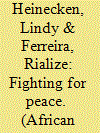

|
|
|
|
|
| Publication |
2012.
|
| Summary/Abstract |
In Africa, most of the present conflicts are civil, intra-state wars where belligerent groups use guerrilla tactics to achieve various political, economic or ideological objectives. The atrocities and the effect of these on-going wars on innocent civilians, human suffering, poverty and development are beyond comprehension. Not surprisingly, the majority of current peace operations are in Africa, with more than 70 countries contributing forces to these conflict zones. On the continent, South Africa has come to assume a leading role in peace operations and is now a major troop-contributing country to UN and AU missions. In the past 11 years, the South African National Defence Force (SANDF) has taken part in no fewer than 14 peace missions. This article provides a brief background of the conflicts in Burundi, the Democratic Republic of Congo (DRC) and Sudan, the different United Nations (UN) and African Union (AU) mandates under which peacekeepers had to operate as well as their objectives, and the extent of South Africa's involvement in the various missions. In the last section, the major challenges, that these operations have posed are highlighted.
|
|
|
|
|
|
|
|
|
|
|
|
|
|
|
|
| 3 |
ID:
165663
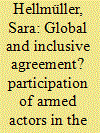

|
|
|
|
|
| Summary/Abstract |
This article provides an analytical framework to understand how participation of armed actors in peace negotiations influences local violence. It argues that the link between violence and exclusion or inclusion of armed actors is often indirect and depends on armed actors’ underlying motivations to be included and their corresponding strategies. Based on an analysis of the Congolese peace process from 1999 to 2003, the article assesses how the mandate of the peace process influenced armed groups’ motivations to be included. It then analyzes the strategies that armed actors used to be included and examines their impact on local violence. Thereby, it allows for a more nuanced understanding of how participation of armed actors in a mediation process influences prospects for peace.
|
|
|
|
|
|
|
|
|
|
|
|
|
|
|
|
| 4 |
ID:
109921
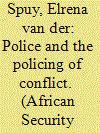

|
|
|
| 5 |
ID:
123996
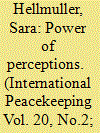

|
|
|
|
|
| Publication |
2013.
|
| Summary/Abstract |
Perceptions of peace and conflict differ among various actors. Exploring them can enhance our understanding of meanings that international and local actors ascribe to a conflict, and what strategies are chosen to respond to it. Drawing on academic literature and empirical data gathered in the Democratic Republic of Congo (DRC), this article analyses how perceptions of the conflict in the DRC influenced the different local and international peacebuilding strategies and the outcomes of their interaction. The international community's priority was the restoration of the state because they saw the conflict as a breakdown of authority at the national level. The liberal state that the international community had foreseen was however hybridized with local authority structures in the course of its interaction with local perceptions and experiences. At the same time, international strategies eschewed or only belatedly included local priorities, such as reconciliation between antagonistic communities and land conflicts. The article thus argues that the interplay of priorities - the space where friction occurs - remains dominated by international actors. As a consequence, it suggests exploring more carefully and pragmatically the potential intermediary role that local peacebuilding actors can play in rendering international strategies more relevant at the local level.
|
|
|
|
|
|
|
|
|
|
|
|
|
|
|
|
| 6 |
ID:
114754
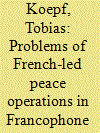

|
|
|
|
|
| Publication |
2012.
|
| Summary/Abstract |
By examining peace operations in Côte d'Ivoire, Chad and the Central African Republic (CAR), and the Democratic Republic of Congo (DRC), this article shows that French-led peace operations in francophone Sub-Saharan Africa are highly problematic. This is especially true for those countries towards which France simultaneously pursues a bilateral military policy. The maintenance of the policy makes the political neutrality of the operations difficult and undermines international peacekeeping efforts. Furthermore, it gives African actors the opportunity to instrumentalize the policies and use them against each other. Therefore, only a full multilateralization of French military engagement, as well as a stronger commitment by other external actors, can make peace operations in the region more credible and more effective.
|
|
|
|
|
|
|
|
|
|
|
|
|
|
|
|